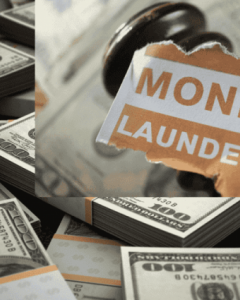Money Laundering Crackdown: US Tightens Regulations on Real Estate Transactions
In a landmark move to combat money laundering and illicit activities, the United States is taking decisive steps to tighten regulations within the real estate sector.
In a landmark move to combat money laundering and illicit activities, the United States is taking decisive steps to tighten regulations within the real estate sector. An upcoming proposal by the US Treasury Department aims to prevent the anonymous purchase of luxury homes, which has been identified as a significant channel for money laundering employed by corrupt oligarchs, terrorists, and other criminals.

Under this new draft regulation, companies operating within the real estate industry will be mandated to report the identity of real estate buyers who make cash transactions to the Financial Crimes Enforcement Network (FinCEN), the financial crime regulator under the jurisdiction of the US Treasury Department. By ensuring transparency in these transactions, the US authorities hope to curtail illegal activities and safeguard the integrity of the real estate market.
Expected to be unveiled this month, the draft proposal promises to establish a more stringent regulatory framework, replacing the existing system that has been plagued by regulatory loopholes. To ensure transparency and gather feedback from various stakeholders, the draft will be made public, allowing for both public and industry input.
However, the American Land Title Association, which represents title insurers, urges FinCEN to exercise caution and not rush the implementation of new regulations. The Association stresses the importance of first defining clear-cut rules and guidelines for companies to adhere to.
It was in March 2023 when Janet Yellen, the Finance Minister at that time, underscored the need to address the long-standing issue of criminals exploiting real estate to conceal their ill-gotten profits. Yellen revealed that between 2015 and 2020, a staggering $2.3 billion had potentially been "laundered" through the real estate market. While US banks have long been obligated to scrutinize customer funds and report suspicious transactions, the real estate industry has thus far evaded similar regulations. Instead, FinCEN has employed regulations that require the reporting of real estate purchases, currently applicable in major cities such as New York, Miami, and Los Angeles. The forthcoming regulation seeks to broaden this requirement and enact it nationwide.
The potential impact of this new regulation cannot be overstated. By mandating real estate professionals, such as title insurers, to disclose the identity of cash buyers, the US authorities are taking critical steps towards dismantling the mechanisms that facilitate money laundering. By lifting the veil of secrecy, they are creating a significant impediment for criminals seeking to exploit the real estate market for illicit activities.
As the US government recognizes the gravity of money laundering in the real estate sector, it demonstrates its commitment to safeguarding the economy, national security, and the integrity of financial systems. The proposed regulation is poised to reshape the real estate industry, instilling greater trust and accountability in transactions.
Money Laundering Crackdown: US Tightens Regulations on Real Estate Transactions
Breaking: Ten Arrested in Singapore for Multi-Billion Dollar Money Laundering Case
In a significant development, ten individuals have been arrested in Singapore for their involvement in a multi-billion dollar money laundering case. Stay updated with the latest news and investigations on this high-profile case.
In a significant development, ten individuals have been arrested in Singapore for their involvement in a multi-billion dollar money laundering case. Stay updated with the latest news and investigations on this high-profile case.
Read moreEuropean Shares Surge as Eurozone Inflation Drops: Will ECB Halt Interest Rate Hikes?
European shares surge as eurozone inflation drops, raising hopes of ECB halting interest rate hikes. Despite a poor performance, softer inflation data leads to gains in real estate and technology shares.
European shares surge as eurozone inflation drops, raising hopes of ECB halting interest rate hikes. Despite a poor performance, softer inflation data leads to gains in real estate and technology shares.
Read moreUK Regulators Shake Up Financial Sector with Stricter Diversity Standards
The Financial Conduct Authority (FCA) and the Prudential Regulation Authority (PRA) in the UK are proposing stricter diversity standards to address workplace bullying and sexual harassment in the financial sector. Learn more about the measures aimed at creating a safer and inclusive environment within organizations.
The Financial Conduct Authority (FCA) and the Prudential Regulation Authority (PRA) in the UK are proposing stricter diversity standards to address workplace bullying and sexual harassment in the financial sector. Learn more about the measures aimed at creating a safer and inclusive environment within organizations.
Read moreSweden's Bankruptcy Rates Skyrocket by 14%, Raising Concerns for Labor Market
Concerns for the labor market in Sweden as bankruptcy rates skyrocket by 14%. Recent data from UC highlights the downturn in sectors such as construction, hospitality, and restaurants.
Concerns for the labor market in Sweden as bankruptcy rates skyrocket by 14%. Recent data from UC highlights the downturn in sectors such as construction, hospitality, and restaurants.
Read moreUSD Resurgence: Dominating Global Financial Landscape
Explore the remarkable resurgence of the USD in the global financial landscape, its impact on other currencies, and implications for businesses and individuals in international trade and investment.
Explore the remarkable resurgence of the USD in the global financial landscape, its impact on other currencies, and implications for businesses and individuals in international trade and investment.
Read moreChina's Economic Challenges: Preventing a Vicious Cycle with the Yuan
Explore the economic challenges faced by China, including the sacrifice of the Yuan to prevent a vicious cycle of low demand and declining output. Learn why experts believe immediate action is crucial.
Explore the economic challenges faced by China, including the sacrifice of the Yuan to prevent a vicious cycle of low demand and declining output. Learn why experts believe immediate action is crucial.
Read moreUSD Near Longest Bull Streak in 9 Years as Optimistic Economic Data Supports
Discover why the USD is on the verge of its longest rising streak since 2014, driven by encouraging US economic data. Although this trend raises doubts about future interest rate hikes by the US Federal Reserve, the Yuan is facing pressures with falling values domestically and internationally due to increasing capital flow concerns and a widening bond yield gap with developed economies. Stay informed on these developments impacting global currency markets.
Discover why the USD is on the verge of its longest rising streak since 2014, driven by encouraging US economic data. Although this trend raises doubts about future interest rate hikes by the US Federal Reserve, the Yuan is facing pressures with falling values domestically and internationally due to increasing capital flow concerns and a widening bond yield gap with developed economies. Stay informed on these developments impacting global currency markets.
Read moreWeakness of Yen Reflects Interest Rate Difference, Poses Valuation Challenges
Explore the factors behind the weakness of the yen and its impact on global economies. The valuation challenges arise from the interest rate difference between Japan and other markets. Gain insights into the concerns of investors and policymakers surrounding this devaluation trend.
Explore the factors behind the weakness of the yen and its impact on global economies. The valuation challenges arise from the interest rate difference between Japan and other markets. Gain insights into the concerns of investors and policymakers surrounding this devaluation trend.
Read moreChina's PBoC Takes Action as Yuan Reaches 16-Year Low
As the yuan hits its lowest level in 16 years, the People's Bank of China (PBoC) is implementing measures to counteract the ongoing decline. Explore the PBoC's efforts to address the currency's depreciation, which is comparable to levels seen during the 2007-2008 global financial crisis. Stay updated on China's attempts to stabilize its currency amidst challenging economic circumstances.
As the yuan hits its lowest level in 16 years, the People\'s Bank of China (PBoC) is implementing measures to counteract the ongoing decline. Explore the PBoC\'s efforts to address the currency\'s depreciation, which is comparable to levels seen during the 2007-2008 global financial crisis. Stay updated on China\'s attempts to stabilize its currency amidst challenging economic circumstances.
Read more













